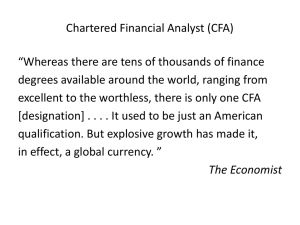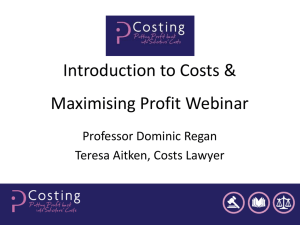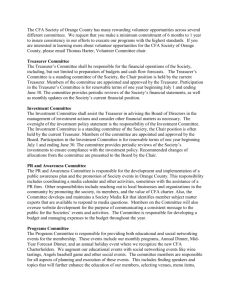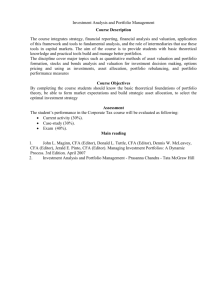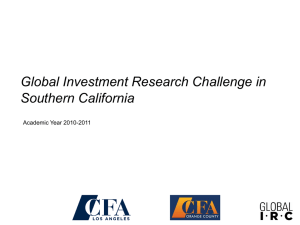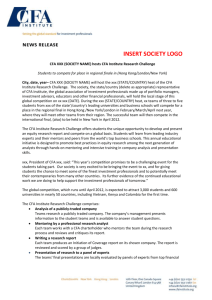Making a claim for cancer
advertisement
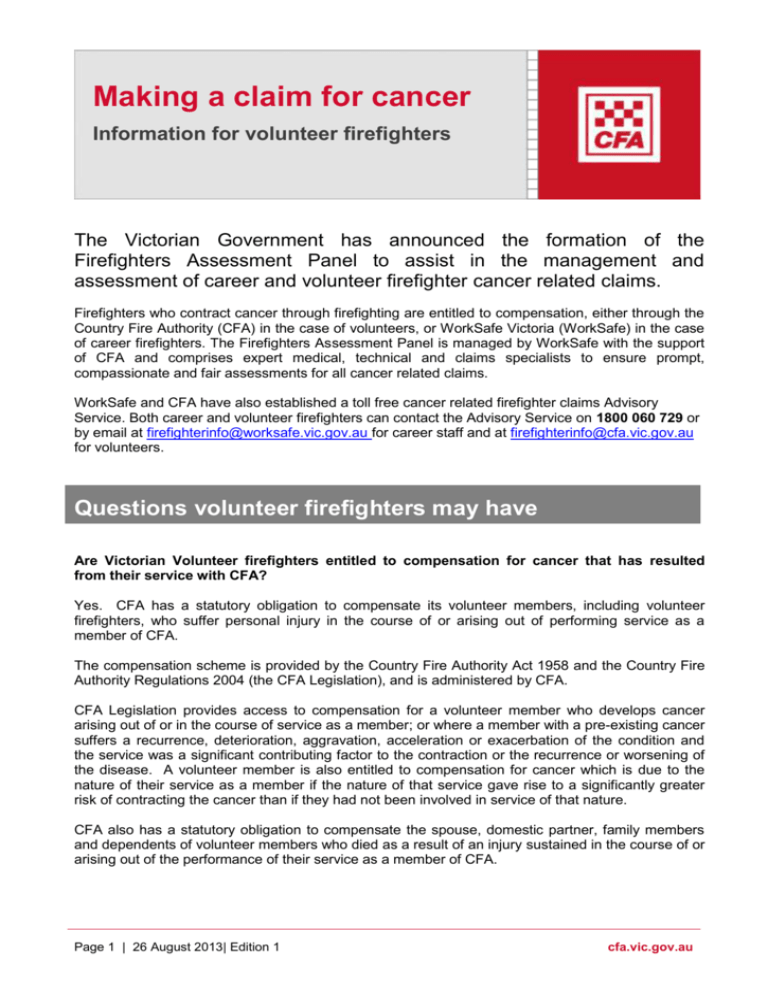
Making a claim for cancer Information for volunteer firefighters The Victorian Government has announced the formation of the Firefighters Assessment Panel to assist in the management and assessment of career and volunteer firefighter cancer related claims. Firefighters who contract cancer through firefighting are entitled to compensation, either through the Country Fire Authority (CFA) in the case of volunteers, or WorkSafe Victoria (WorkSafe) in the case of career firefighters. The Firefighters Assessment Panel is managed by WorkSafe with the support of CFA and comprises expert medical, technical and claims specialists to ensure prompt, compassionate and fair assessments for all cancer related claims. WorkSafe and CFA have also established a toll free cancer related firefighter claims Advisory Service. Both career and volunteer firefighters can contact the Advisory Service on 1800 060 729 or by email at firefighterinfo@worksafe.vic.gov.au for career staff and at firefighterinfo@cfa.vic.gov.au for volunteers. Questions volunteer firefighters may have Are Victorian Volunteer firefighters entitled to compensation for cancer that has resulted from their service with CFA? Yes. CFA has a statutory obligation to compensate its volunteer members, including volunteer firefighters, who suffer personal injury in the course of or arising out of performing service as a member of CFA. The compensation scheme is provided by the Country Fire Authority Act 1958 and the Country Fire Authority Regulations 2004 (the CFA Legislation), and is administered by CFA. CFA Legislation provides access to compensation for a volunteer member who develops cancer arising out of or in the course of service as a member; or where a member with a pre-existing cancer suffers a recurrence, deterioration, aggravation, acceleration or exacerbation of the condition and the service was a significant contributing factor to the contraction or the recurrence or worsening of the disease. A volunteer member is also entitled to compensation for cancer which is due to the nature of their service as a member if the nature of that service gave rise to a significantly greater risk of contracting the cancer than if they had not been involved in service of that nature. CFA also has a statutory obligation to compensate the spouse, domestic partner, family members and dependents of volunteer members who died as a result of an injury sustained in the course of or arising out of the performance of their service as a member of CFA. Page 1 | 26 August 2013| Edition 1 cfa.vic.gov.au Making a claim for cancer Subject to the requirements of the CFA legislation, the types of compensation payable include: Weekly payments of compensation for loss of income. Medical and like expenses. Impairment benefit. Dependency benefits. What should you do if you have developed cancer and you think it may be related to service with CFA? The most important thing is getting appropriate medical treatment from your treating health practitioner. If you wish to claim compensation you should complete and submit a CFA Volunteer Compensation Claim Form. If you wish to claim for dependency benefits you should complete and submit a CFA Dependency Claim Form. These forms can obtained by calling the Firefighter Advisory Service on 1800 060 729. If you are no longer a volunteer member and you believe your cancer arose from CFA service you are entitled to make a claim. If you are a dependent of a person who was a volunteer member and you believe that person's death was caused by cancer arising from his or her service as a CFA volunteer member you are also entitled to make a claim. Please note irrespective of any linkage to CFA service you and your family can access CFA’s welfare services, which are detailed further in this information sheet. You will need to complete as much detail on the CFA Compensation claim form as you can. You must complete section 5 of the claim form, including authorising the release of medical information. Section 6 of the claim form is not required to be completed at this stage. Please send the completed form to CFA’s Compensation Section at PO Box 701, Mount Waverley 3149. The sooner you submit the claim form, the sooner a decision can be made on whether you are eligible for compensation. It is important that the claim form is completed and sent back to the CFA Compensation Section as soon as possible so your claim can be assessed. If your injury/condition has resulted in a permanent impairment and you would like to make a claim for permanent impairment compensation, you must do this separately to any claim you make for weekly payments for loss of income or medical and like expenses. Please contact the Firefighter Advisory Service on free call 1800 060 729 and ask about a CFA Permanent Impairment Compensation form. Separate to compensation available under the CFA legislation, you may also be entitled to common law damages for pain and suffering and/or economic loss. CFA recommends you seek legal advice if you wish to consider this action. Get a medical certificate If you have suffered a loss of income because you can't do your normal job you should first see a medical practitioner who can issue you with a WorkSafe Certificate of Capacity. The certificate needs to describe your injury, your anticipated time off work and possible alternative duties or hours. Page 2 | 26 August 2013 | Edition 1 cfa.vic.gov.au Making a claim for cancer Further information to include with your claim It is not mandatory to provide the following information to commence the claim process, but to ensure your claim has the best chance of being properly assessed, it is recommended you include as much relevant information as possible to support your claim. This can be attached to your claim form if there is insufficient room on the form. It could include: • • Your fire service history Your employment history When claiming for a cancer believed to be related to CFA service, details of any specific exposures to hazardous substances you can recall and/or the names and dates of any large fires or incidents you may have attended would assist. In addition it is recommended you include any relevant medical reports from your treating health practitioner(s) detailing the nature of your condition, when you were first diagnosed, the treatment you are receiving, any known risk factors or suspected causes. If you do not provide this information, your claim will still be assessed and CFA’s Compensation Section will endeavour to obtain this information utilising the medical authority contained in your claim form. The assessment process - what happens after the claim is submitted? Under the CFA Act, CFA is responsible for assessing your claim, including obtaining additional medical and claim circumstance information if required. To assist in this process CFA will utilise the Firefighters Assessment Panel in the management and assessment of volunteer member cancer related claims. CFA will notify you in writing of its decision to accept or reject your claim. If you believe CFA is unaware of some aspect of your injury or illness you should contact the CFA Claims Section to discuss the matter. You may also be contacted by an approved claims investigator to gather further information to support your claim. You are not obliged to discuss your claim with the investigator; however, the information you provide may be useful in assessing your claim. Independent medical examinations Independent medical examiners are independent healthcare professionals appointed by WorkSafe or CFA based on strict criteria. They are assigned to carry out examinations based on their area of expertise, for example, an orthopaedic surgeon to assess a musculo-skeletal injury. For volunteer members making a claim for CFA service-related cancer, you will be examined by an oncologist (cancer specialist). They work in private practice or hospitals, in addition to performing independent medical examinations, but they cannot examine an individual they have previously treated. They are not employees or representatives of WorkSafe or CFA, however, they are paid by CFA’s Volunteer Compensation Scheme to examine injured volunteer members and provide independent medical advice where deemed necessary. Independent medical examiners are subject to a rigorous quality assurance program by WorkSafe to ensure the ongoing quality of their work. Page 3 | 26 August 2013 | Edition 1 cfa.vic.gov.au Making a claim for cancer You may be asked to attend an independent medical examination. The examinations are used to help understand and assess your injury or illness to ensure you receive the appropriate entitlements. You will be notified of the time and place of the examination. If the time is not suitable, you should contact your CFA Claims Officer as soon as possible to reschedule the appointment or make alternative arrangements. The examination will take approximately one hour. The healthcare professional will be given any medical information you have provided as well as any information regarding your service history. Firefighters Assessment Panel A Firefighters Assessment Panel has been formed to assist with the management and assessment of career and volunteer firefighter cancer related claims. The Firefighters Assessment Panel is managed by WorkSafe with the support of CFA and comprises expert medical, technical and claims specialists to ensure prompt, compassionate and fair assessments for all cancer related claims. Through this assessment some claims may require a second medical opinion. In such cases, an independent medical examiner will prepare a report based on the examination and this will be reviewed, along with any other reports or information you or your treating health practitioner(s) have provided, by a second independent medical examiner (generally an occupational physician). This does not require you to attend a second examination. The occupational physician will then write their own report, which will be provided, along with the first report, to the CFA Compensation Section. If you would like a copy of the report, you can request this from the CFA Compensation Section. CFA will aim to obtain all requested reports in a timely manner to make a decision. The availability of the independent medical examiners, your availability to attend an examination and other administrative requirements may impact on the timeframe for CFA to determine the claim. Please refer to the decision making process below for more information. While your claim is being assessed While your claim is being assessed, you can: In regards to loss of income you may apply to Centrelink for any benefits that you may be entitled to. Centrelink will confirm the status of your claim with CFA. However, if Centrelink pays benefits to you and your claim is accepted, your loss of income may be reduced to take into account any Centrelink benefits received. Discuss access to sick or other leave entitlements with your employer. If your claim is accepted, any leave you took because of your illness may be re-credited to you or your employer Page 4 | 26 August 2013 | Edition 1 cfa.vic.gov.au Making a claim for cancer The decision making process To accept a claim a sufficient connection between your cancer and your service as a volunteer member must be established. The main tests for entitlement to compensation are as follows: 1) There must be an injury arising out of or in the course of the performance of your duties as a volunteer member; or 2) If you contract a disease in the course of your role as a firefighter or suffer a recurrence, deterioration, aggravation, acceleration or exacerbation of any pre-existing injury or disease, your service as a volunteer member must be a significant contributing factor to the contraction of the disease or recurrence or worsening of your cancer; or 3) If you contract cancer, the nature of your role as a volunteer member must give rise to a significantly greater risk of you contracting the disease than had you not been undertaking service of that nature. Welfare Services A range of welfare services are available to volunteers and their families which are summarised below: Peer Support The CFA Peers provides support, acknowledgement, recognition and connection for members and their families. This service is provided by trained Peers through the provision of Psychological First Aid and welfare support. Peers provide a crucial link to other support services. Chaplaincy Support Chaplains provide pastoral care within their CFA District. Pastoral care includes spiritual, physical, psychological and emotional care and wellbeing support which is not limited to a faith. Psychologist/Counsellor Support (Member Assistance Services) Psychologists/counsellors provide professional mental health services to members and their immediate family members. They can assist a member in a range of areas, including family and relationship issues. A member is offered three confidential, free counselling sessions and CFA is invoiced for the cost of these sessions without any details being passed on to CFA. These services offer confidential free support. Any member or family members can access support at any time. Peer support can be accessed through the Rostered Duty Officer, Office in Charge, or the Peer Coordinator Psychologists/Counsellors can be contacted directly by contacting the Member Assistance Program on 1300 795 711 Chaplains can be contacted directly or by contacting Converge International on 1800 337 068 Why does the Victorian list of 25 proclaimed diseases not include the 12 forms of cancer prescribed under the Commonwealth's Safety, Rehabilitation and Compensation Act 1988, which covers Commonwealth firefighters? Page 5 | 26 August 2013 | Edition 1 cfa.vic.gov.au Making a claim for cancer The medical conditions proclaimed as diseases under the WorkSafe legislation have been subject to stringent and comprehensive evidence requirements particular to Victoria's compensation system. The proclaimed medical conditions for Victorian workers are strongly linked to occupational exposure and have a greater incidence rate of such conditions among workers undertaking specific types of work than the types of cancer included in the Commonwealth legislative amendments. What is being done to assess the links between the exposure of firefighters to firefighting activities and the incidence of cancer and other health problems? Existing research has not established a conclusive medical correlation between firefighting and cancer. One of the main pieces of existing research in this area is a 2006 US study led by GK LeMasters, titled Cancer Risk among Firefighters: A Review and Meta-analysis of 32 Studies. (LeMasters GK, Genaidy AM, Succop P, et al. (2006) J Occup Environ Med; 48: 1189–1202.) In 2010, the International Agency for Research on Cancer (IARC) published an article on the carcinogenic risk to humans from firefighting (IARC (2010). IARC monographs on the evaluation of carcinogenic risks to humans. Volume 98.Shift-work, painting and fire-fighting. Lyon: International Agency for Research on Cancer.) Two world-leading studies are currently being carried out by Monash University to examine the incidence of cancer and other health problems and their relationship to exposures connected with the work of firefighters. The results of these studies, due to be published in 2014, are expected to contribute significantly to the scientific body of evidence in this area. One study will interview 200,000 firefighters worldwide, while the other, a CFA Cancer Incidence and Mortality Study, will focus on Fiskville PAD workers and instructors identified by Professor Joy in his report "Report of the Independent Fiskville Investigation" (the Professor Joy Report) as having a medium or high likely relative risk of chronic exposure to chemicals and products of combustion. The study will also include career firefighters who attended recruit courses at Fiskville between 1971 and 1999, who are identified by the Professor Joy Report in the low risk category. Page 6 | 26 August 2013 | Edition 1 cfa.vic.gov.au
